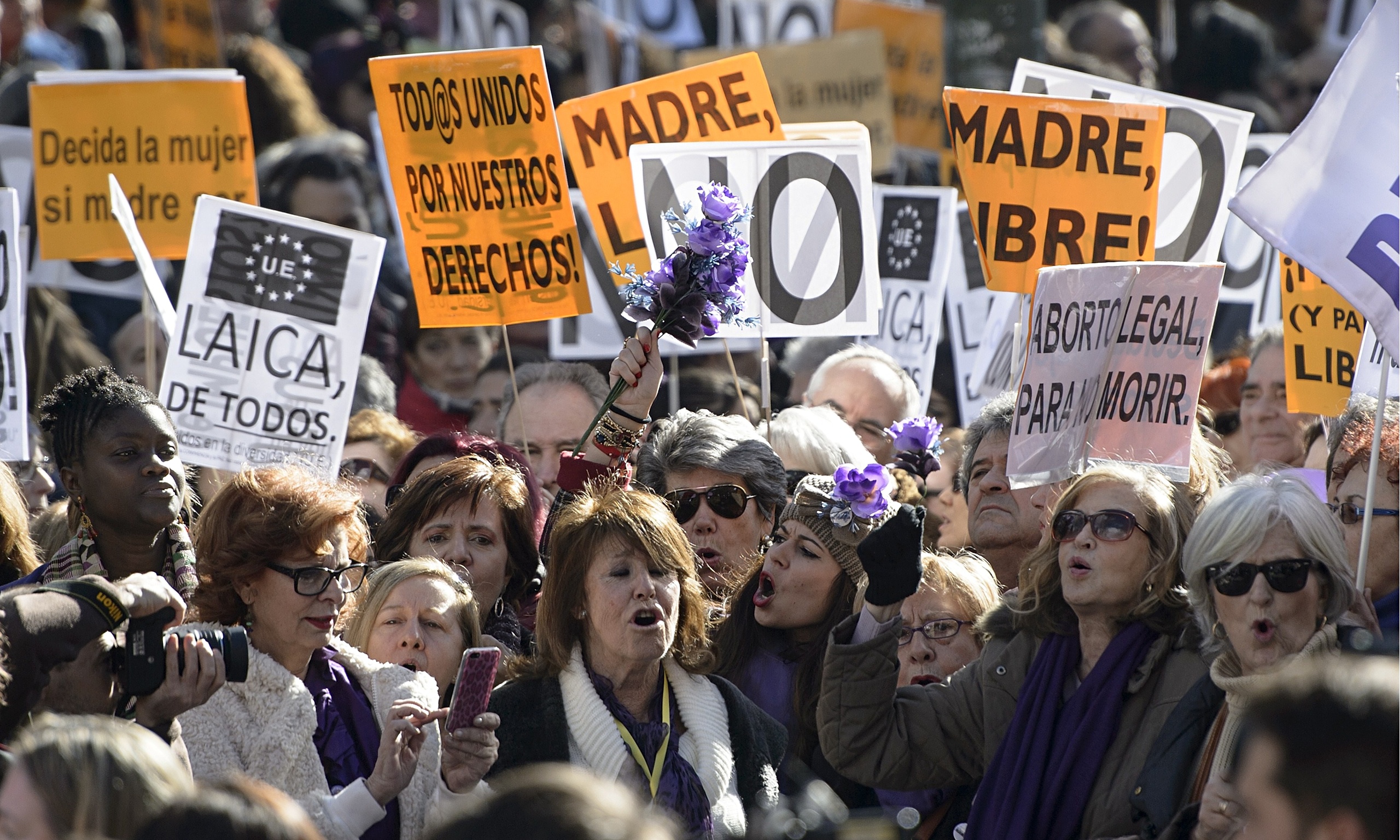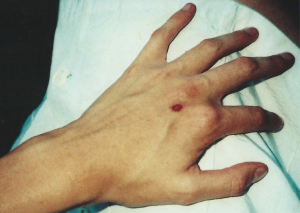
Madre, Libre!: Spain’s Battle Over Abortion
by Huw Spencer | July 4, 2014
Tens of thousands of protesters are lining the streets of Spain, and the word retroceso is on their lips. Almost forty years on from the death of Franco, the Justice Minister Alberto Ruis-Gallardón is again striking the tone of a dictator, as he declares in the face of overwhelming public opposition that ‘‘no screams or insults” will persuade him to abandon his party’s draft bill to ban abortion. If the bill is passed, Spain will once again have some of the harshest abortion laws in Europe. Increasingly, the legislation is seen not only as a question of human rights, but also of democracy. While Ruis-Gallardón’s Partido Popular plays party politics, polls show that 80 per cent of the Spanish population oppose the law. The words “This democracy is a lie” are plastered across one wall of La Rambla in Barcelona, and demonstrators are flooding cities with banners, flash mobs and a large papier mâché vagina. Yet the government remains resolute. As the rest of Europe looks on with apathy, the coming months will prove a huge test of how far Spain has really come since 1975.
Abortion was first made available in Spain in 1985, although only in cases of rape or risk to the mental or physical health of the mother or fetus. However, the requirements to prove that the pregnancy would endanger the mother’s mental health were often loosely interpreted by medical professionals. As a result, between 1998 and 2008, the number of abortions per year in Spain more than doubled from 53,847 to 115,842. In 2010, under the last government, abortion was fully legalised up to the 14th week of pregnancy. Since then, there has not been a significant increase in the number of abortions. In fact, according to Yo decido, a campaign group for women’s rights, the legalisation, “together with the right educational policies”, has led to a decrease in the number of unwanted pregnancies and abortions throughout Spain.
It seems those statistics are unimportant for Ruiz-Gallardón. If Spain passes his party’s bill, it will become the first country in the EU to reverse the legalisation of abortion. The minister argues that the new law focuses above all on the rights of women and the unborn child. But this move is rooted in politics, not ethics. With a crippled economy and a 26 per cent unemployment rate, Prime Minister Mariano Rajoy has been put under increasing pressure from the ‘ultraconservadores’ of his party to keep the anti-abortion promise made in its election campaign. Likewise, the “orders of the Catholic church” are identified by Maria Nebot, a spokesperson for Yo decido, as a crucial influence on the government. As it turns out, the Prime Minister has grossly miscalculated the best way to boost party support. Despite Rajoy’s need to gather votes from those most affected by the economic downturn, the impact of the law will be most strongly felt by the poor. Nebot argues that women who want to carry out abortions “will be forced to do so illegally, putting their lives at risk, while those who can afford it will go to other European countries for the procedure”. Even women who fall under the exceptions to the law – victims of rape or medical circumstance – may not be guaranteed a safe abortion. Nebot claims that such is the sheer number of obstacles placed in their way by the small print of the new legislation, medical professionals might be reluctant to perform the procedure for fear of inviting the scrutiny of the authorities.
In February, Socialists in Spain tried to pass a motion rejecting the bill. When the motion failed by 183 votes to 151, many thought that the chances of halting the legislation were slim. However, that has not prevented thousands of women and men from flooding the streets in protest, nor has it dented their optimism. As a response to the draconian message sent out by Ruis-Gallardón, protesters have focused on voicing their outrage without relying on “screams and insults”. In late March, the campaigners at Yo Decido populated every airport on the Canary islands, armed with suitcases and banners depicting the harsh reality of “abortion flights”, should the bill be turned into law. Women across the country have attended the commercial registry office to sign over their bodies – if they are to be treated like objects they might as well make it official. Yo Decido has collected more than 200 signatures from mental health professionals petitioning against Gallardón’s law. On 5th April, women dressed in hospital gowns marched through the streets of Iruñea with their hands cuffed behind their backs. On 12th April, the Cofradía del Santísimo Coño de todos los Orgasmos, (the Sisterhood of the Most Holy Cunt of all Orgasms) paraded their idol, a large vagina that looks to be made out of papier maché, around the Plaza de Lavapies in Madrid. In a direct attack on the Church’s influence over the rights of women, the protestors dressed in robes that parodied the typical cloaks and hoods worn in Catholic processions during Holy Week, wearing a feminist symbol instead of a cross. They will worship their own bodies until the government and the Church give them their rights.
The sense of community created by the political unrest is immediately evident on the streets of Barcelona. The anarchist and feminist organisation Arrán convenes regularly in the Gracia district to protest about the actions of the government. Surrounded by banners that declare “Desobeim l’absurd”(Disobey the absurd) in the shadow of the statue La Colometa, a symbol of female oppression during the Civil War, they sit and eat together in the Plaza del Diamante. The peaceful nature of their demonstration does not prevent police presence throughout the day. Their feminist graffiti is stamped across the district and their sense of indignation is raw. Gallardón’s bill has even caused the differences between Madrileños and Catalans to be put to one side, an impressive achievement considering the pull of separatist politics in the area. One member of Arrán explained how the bill has “brought different communities and activists across Spain together” despite their political or cultural differences
But do these protestors have any hope of being heard? Nebot seems to think so: “The reaction to the law has forced the government to consider another approach. It looks like they are waiting to see what happens in the European elections in May, scared that if they continue insisting on a law change, this will translate into a loss of votes.” Europe may yet have a large role to play in the passage of the bill. In early April, at the 47th session of the Commission on Population and Development at the United Nations, various countries including the Netherlands, France and the UK stressed the importance of decriminalising abortion. Twenty years on from the Cairo Conference, at which 179 governments agreed that it was imperative to provide universal access to family planning and sexual and reproductive health services, international eyes will be firmly fixed on Spain’s actions. With mounting pressure from all sides, the response from Rajoy’s government will define his premiership. While Gallardón and friends forge ahead with their project to take Spain back to the Franco era, the Spanish people are determined to stay put in the 21st century. In response to Gallardón’s stubborn war cry, María Nebot comes up with one of her own: “We won’t stop until we achieve our own objectives; we will do everything we can think of to stop him.” I don’t doubt it.




